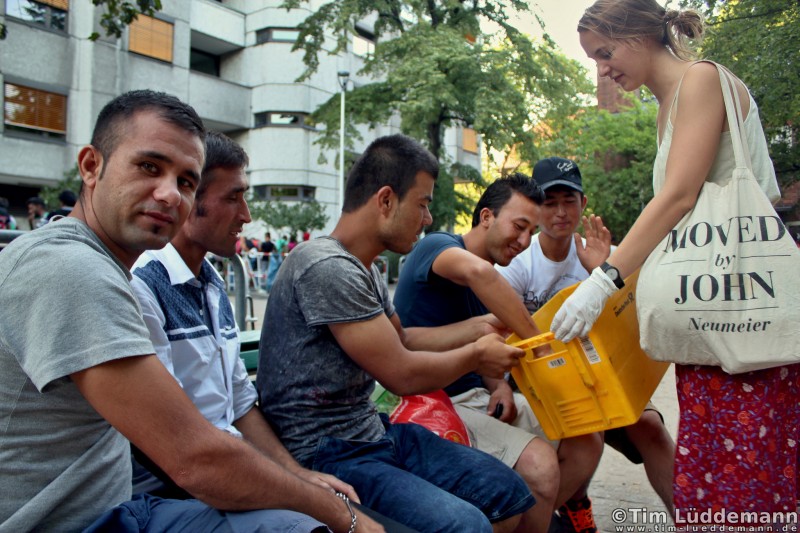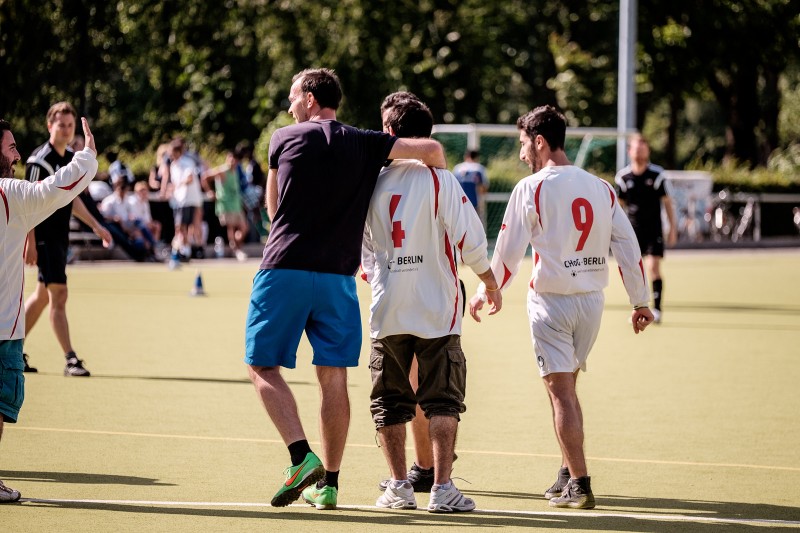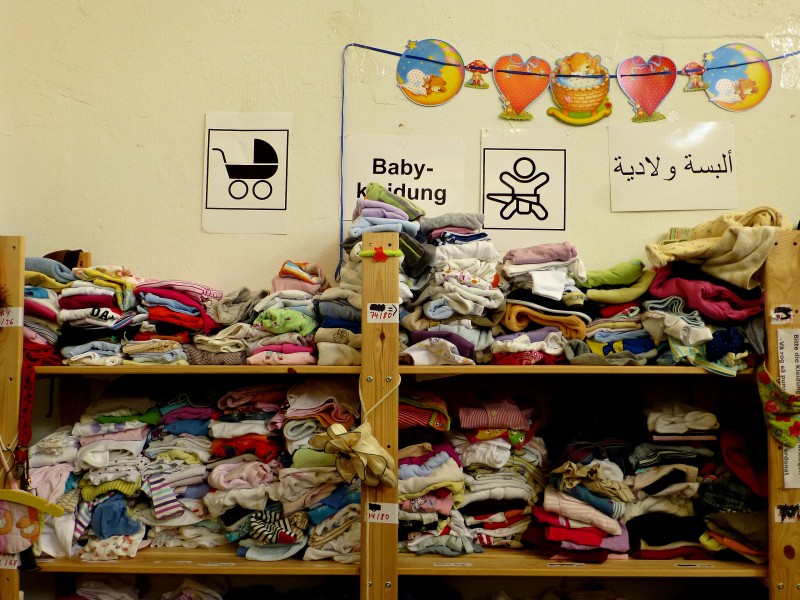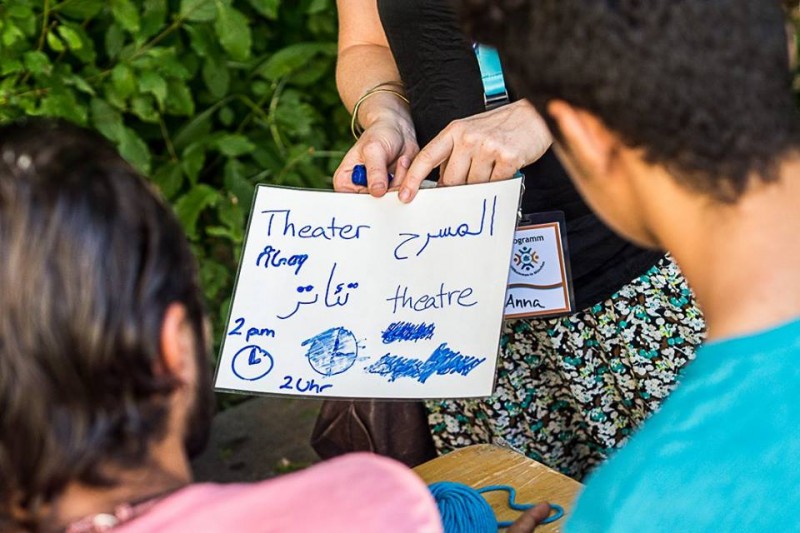
Volunteers share food and drinks with refugees who wait in front of the Berlin Office for Health and Social Affairs (#LaGeSo).
Photo from Tim Lüddemann [1] on 13 August 2015 on Flickr [2]. Non-commercial use with credit to owner permitted.
All links lead to German language pages, except when otherwise noted.
War, crisis, and poverty in the Middle East, South Europe, and Africa have meant the number of refugees in Germany [3] has increased, and many cities and local authorities are proving themselves to be unprepared. In order to help the people, who are mostly from Syria, Albania, Afghanistan, and Iraq, many impromptu and self-organised initiatives of dedicated volunteers have developed all over Germany.
Most of the projects provide refugees with donations of food and clothes, organise interpreters and chaperons to go to local administrations and doctors’ offices, arrange language tuition and provision of free wireless Internet, and provide child care and leisure activities.

Players at a football tournament for teams with and without refugees by [sports club] Brot und Spiele e.V. Photo by Andi Weiland [4] on 25 July 2015 on Flickr [5]. Published under the Creative Commons Licence [6] [en].
Many of the initiatives in this movement prefer social media or email groups to coordinate their work. It does mean, however, that they often stay invisible to outsiders, as they often do not have the time or manpower to create their own web presence or to maintain a website, journalist Birte Vogel [8]explained to Global Voices in conversation:
Ziel dieser Initiativen ist es, loszugehen und zu helfen, Nägel mit Köpfen zu machen, nicht einfach rumzureden, sondern wirklich den Kontakt zu suchen und tätig zu werden. […] Die reden nicht so viel über das, was sie machen, sondern sie machen es einfach.
The aim of these initiatives is to go in and help; to do the job properly; not just to talk about it, but to actually seek contact and to get active. […] They don't talk so much about what they do, they just do it.
To make it possible for interested volunteers to contact organisations and to encourage further initiatives, Birte Vogel has created an information hub with her blog “Wie kann ich helfen? [9]” (How can I help?), where she extensively researches, documents, and categorises each of her suggested projects.
Those interested in volunteering often encounter difficulties while researching suitable initiatives within the scope of refugee help. Not all [volunteering] co-ordination sites can tell you [10] what kinds of initiatives exist, who the contact person is, where one would be useful with their particular skills, or which projects are accepting food and clothing donations—provided there even is a co-ordination site in the first place.

Shelves with baby clothes in the warehouse of the initiative “Willkommen in Essen [11]” (Welcome to Essen). Photo by Anne Hemeda on 3 September 2015.
The aid projects often move on a thin line between a grassroots movement, in which the biggest number of volunteers possible take part on the spur of the moment and generally without obligation in order to react to an acute emergency, and the need to create structures, not least of all to secure the protection of refugees and their participation during the planning of action. But stabilization and sustainability of aid projects is not always desirable, as it turns out.
A study by the Berliner Institut für empirische Integrations- und Migrationsforschung [12] (Berlin Institute for Empirical Intergration and Migration Research – BIM) suggests that in 2014 just under 40 percent of the total refugee aid work to further existing structure for refugees was voluntarily offered. However, volunteers tended to take up tasks which would often have a very fundamental meaning, like the provision of accommodation, transportation, and clothes:
Vielmehr sind Ehrenamtliche aber durch Tätigkeiten eingebunden, die durch strukturelle Mängel entstehen. Der größte Anteil ehrenamtlicher Arbeit wird investiert, wo Behörden versagen, angemessene Kommunikation und Umgang mit Asylbewerbern und Flüchtlingen zu ermöglichen.
Volunteers are however, much more often involved in tasks that arise from structural shortcomings. The biggest portion of voluntary work is invested where public agencies fail to make adequate communication and contact with asylum seekers and refugees possible.
When hectic tent cities are built in towns and the aid is organised in the emergency accommodations, volunteers often work in teams with the appropriate government agencies and social service providers. In an emergency accommodation in Leipzig members of the Johanniter-Unfall-Hilfe [an aid agency] have done volunteer work from the beginning of August, around the clock [13] and have canvassed for medical supervision and transportation services from more volunteers from the population. At the same time, without the dedication of the volunteers [14] in front of the Berlin State Office for Health and Social Affairs, the care for the refugees would not be guaranteed.
Ehrenamtliches Engagement ist wichtig, darf aber nicht die professionelle Sozialarbeit ersetzen
Volunteer engagement is important, but it must not replace professional social work.
The above point was made by the Amadeu Antonio Stiftung in their article “10 Punkte für eine Kommunale Willkommensoffensive” [15] (“10 Points for a Community Welcome-Offensive”). Hence, organisations and volunteer campaigners for refugee aid are demanding that local authorities, states, and the federal government take responsibility and provide human and financial resources. Without appropriate policy, the ‘welcome culture’ in Germany is missing a sustainable framework, according to the human rights organisation ProAsyl [16] (Pro-Asylum).
For volunteers in existing aid projects, however, contact people, a professional chaperon, or supervision are also necessary, as they come into contact with people who during their journey have often had traumatic experiences and could be emotionally overwhelmed, said Birte Vogel. It goes without saying that such care of traumatised refugees must also be carried out by professionals.

At the preparations for a theatre performance with young refugees in Munich. Photo [17] from the Facebook page for the project “Willkommen in München [18]” (Welcome to Munich), use courtesy of [youth organisation] Kreisjugendring München-Stadt (Council of Youth Groups Munich City), uploaded 7 August 2015.
At the same time however, in the past few years on average 70 percent more volunteers have involved themselves within the area of refugee work, according to the study by BIM [12]. In the ARD-DeutschlandTrend (ARD-German Trend) from September 2015 [22], 88 percent of the Germans polled said they would donate to refugees and 68 percent said they would get involved in volunteering for refugees. Birte Vogel, who in the last few months has researched and learned about around 400 projects, said excitedly that she is seeing that people in these initiatives are acting with an amazing amount of creativity, have many ideas, and exhibit a lot of idealism and human kindness.
For these reasons the volunteer initiatives are making an important contribution towards building a caring and peaceful community for the refugees. The job of German politics is to create the structural conditions and sustainability opportunities for this ‘welcome culture.’